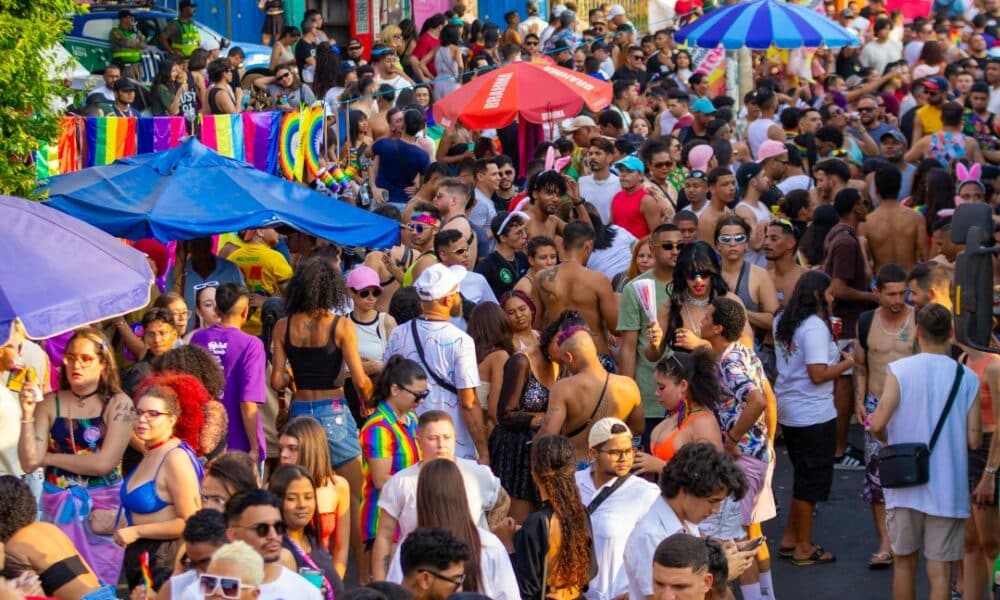The United States government has issued a new security alert for American citizens planning to visit Brazil during the 2025 Carnival. The statement emphasizes the need for heightened awareness and precaution during the festivities, which attract millions of tourists to various Brazilian cities. According to the official recommendation, travelers should avoid walking alone, especially at night, keep a close watch on their belongings, and refrain from displaying valuables such as jewelry and expensive electronics. Additionally, the U.S. embassy warns that opportunistic crimes are common during major events and that tourists should be alert to scams and thefts, which tend to rise significantly at this time of year. Another key point in the statement is the risk of violence in areas considered dangerous, such as favelas, where Carnival events may take place, but visitor safety is not guaranteed.
The alert also warns that American tourists should avoid accepting drinks from strangers, especially in bars and parties, as there have been reports of incidents involving illicit substances used to incapacitate victims and facilitate robberies. It also provides guidance on safe transportation, recommending that visitors use reliable private transportation services and avoid unregistered taxis. The statement cautions that, in large crowds, theft of cell phones, wallets, and passports is common, making it essential to keep documents secure.
Embaixada dos EUA emite alerta de segurança para americanos no Carnaval 2025 https://t.co/HvEY0IaU7i #g1 #carnavalnog1
— g1 (@g1) February 7, 2025
Brazil’s Carnival, scheduled to take place from February 28 to March 3, 2025, is one of the world’s largest cultural events, drawing millions of revelers to cities such as Rio de Janeiro, São Paulo, Salvador, and Recife. The festivities include samba school parades, street parties, and private events, significantly boosting tourism and the country’s economy. Despite the event’s grandeur, visitor safety remains a constant concern for both national and international authorities.
The U.S. embassy recommends that tourists adopt basic security measures to minimize risks. Some of these measures include:
- Avoiding extremely crowded areas where pickpocketing and phone thefts are frequent.
- Using safe transportation, such as reputable ride-hailing apps or licensed taxis.
- Not carrying large amounts of cash, prioritizing cards and digital payments.
- Keeping passports and documents secure, preferably in hotel safes.
- Not accepting drinks from strangers, as there have been reports of scams involving spiked drinks.
- Avoiding favelas and high-crime areas, regardless of local events.
These recommendations are reinforced due to the history of incidents involving tourists during Carnival. In previous years, there were reports of thefts in overcrowded street parties, financial scams targeting foreigners, and cases of assault following robberies. Brazil, as one of the countries that receives the most international visitors during Carnival, faces ongoing challenges in ensuring tourist safety.
Rio de Janeiro, one of the top destinations for tourists during Carnival, has seen high rates of theft and robbery. Recent data shows that during the 2024 Carnival, street crimes increased by approximately 30% compared to the previous year. In São Paulo, street parties have strong police presence, but crimes against tourists remain common. In Salvador, where street Carnival is one of the most vibrant in Brazil, there have been reports of scams involving ticket resellers selling counterfeit passes for exclusive events.
Historically, the U.S. government issues security alerts for its citizens whenever large-scale events occur in countries with potential risks. In 2017, a similar advisory was released for American tourists planning to visit Brazil during Carnival, highlighting similar recommendations. In 2020, before the COVID-19 pandemic, the embassy reinforced the need for caution regarding scams and assaults in tourist areas. In 2023, with the full return of Carnival festivities after the pandemic, the warning was reissued, mentioning violent incidents recorded in previous years.
In addition to the United States, other countries also issue recommendations for their citizens during major events in Brazil. The United Kingdom, for instance, frequently warns about pickpocketing and assaults in tourist areas, advising visitors to avoid carrying valuables. The French government also emphasizes the need for caution, particularly for tourists attending large gatherings. Canada has included Brazil on its list of destinations that require heightened vigilance due to crime risks during large-scale events.
Brazil’s Carnival generates significant economic activity, bringing billions of reais to sectors such as tourism, hospitality, and commerce. In 2024, it was estimated that the event generated around R$ 8 billion, with millions of tourists traveling across the country. However, the increased number of people on the streets also poses security challenges. In Salvador, for instance, more than 5,000 medical treatments and numerous cases of theft and robbery were reported during the previous year’s Carnival. In Rio de Janeiro, the city government strengthens policing in high-traffic areas for revelers, yet crimes continue to be a concern for both tourists and locals.
Police presence is intensified in several Brazilian cities during Carnival, with reinforced security in the busiest tourist spots. In Rio de Janeiro, the Military Police carry out specific operations to protect tourists along the South Zone’s coastline, where theft incidents are most frequent. In São Paulo, the Metropolitan Civil Guard and the Military Police increase patrols in street parties to reduce cases of violence and robberies. In Recife, where the Galo da Madrugada parade gathers millions of revelers, a strong security scheme is in place to prevent disturbances and crimes.
American tourists visiting Brazil during Carnival should consider enrolling in the STEP (Smart Traveler Enrollment Program), which allows the U.S. embassy to send real-time alerts about potential risks. Additionally, keeping emergency contacts accessible, such as consulate and local emergency service numbers, is highly recommended. The U.S. embassy in Brasília and the consulates in Rio de Janeiro, São Paulo, and Recife can be contacted in emergencies involving American citizens.
The statement reinforces that while Brazil is a vibrant and culturally rich destination, prioritizing safety is essential for those looking to enjoy Carnival festivities without incidents. The security alert does not prevent Americans from visiting Brazil but strongly advises them to follow preventive measures to avoid unpleasant situations during the event.

The United States government has issued a new security alert for American citizens planning to visit Brazil during the 2025 Carnival. The statement emphasizes the need for heightened awareness and precaution during the festivities, which attract millions of tourists to various Brazilian cities. According to the official recommendation, travelers should avoid walking alone, especially at night, keep a close watch on their belongings, and refrain from displaying valuables such as jewelry and expensive electronics. Additionally, the U.S. embassy warns that opportunistic crimes are common during major events and that tourists should be alert to scams and thefts, which tend to rise significantly at this time of year. Another key point in the statement is the risk of violence in areas considered dangerous, such as favelas, where Carnival events may take place, but visitor safety is not guaranteed.
The alert also warns that American tourists should avoid accepting drinks from strangers, especially in bars and parties, as there have been reports of incidents involving illicit substances used to incapacitate victims and facilitate robberies. It also provides guidance on safe transportation, recommending that visitors use reliable private transportation services and avoid unregistered taxis. The statement cautions that, in large crowds, theft of cell phones, wallets, and passports is common, making it essential to keep documents secure.
Embaixada dos EUA emite alerta de segurança para americanos no Carnaval 2025 https://t.co/HvEY0IaU7i #g1 #carnavalnog1
— g1 (@g1) February 7, 2025
Brazil’s Carnival, scheduled to take place from February 28 to March 3, 2025, is one of the world’s largest cultural events, drawing millions of revelers to cities such as Rio de Janeiro, São Paulo, Salvador, and Recife. The festivities include samba school parades, street parties, and private events, significantly boosting tourism and the country’s economy. Despite the event’s grandeur, visitor safety remains a constant concern for both national and international authorities.
The U.S. embassy recommends that tourists adopt basic security measures to minimize risks. Some of these measures include:
- Avoiding extremely crowded areas where pickpocketing and phone thefts are frequent.
- Using safe transportation, such as reputable ride-hailing apps or licensed taxis.
- Not carrying large amounts of cash, prioritizing cards and digital payments.
- Keeping passports and documents secure, preferably in hotel safes.
- Not accepting drinks from strangers, as there have been reports of scams involving spiked drinks.
- Avoiding favelas and high-crime areas, regardless of local events.
These recommendations are reinforced due to the history of incidents involving tourists during Carnival. In previous years, there were reports of thefts in overcrowded street parties, financial scams targeting foreigners, and cases of assault following robberies. Brazil, as one of the countries that receives the most international visitors during Carnival, faces ongoing challenges in ensuring tourist safety.
Rio de Janeiro, one of the top destinations for tourists during Carnival, has seen high rates of theft and robbery. Recent data shows that during the 2024 Carnival, street crimes increased by approximately 30% compared to the previous year. In São Paulo, street parties have strong police presence, but crimes against tourists remain common. In Salvador, where street Carnival is one of the most vibrant in Brazil, there have been reports of scams involving ticket resellers selling counterfeit passes for exclusive events.
Historically, the U.S. government issues security alerts for its citizens whenever large-scale events occur in countries with potential risks. In 2017, a similar advisory was released for American tourists planning to visit Brazil during Carnival, highlighting similar recommendations. In 2020, before the COVID-19 pandemic, the embassy reinforced the need for caution regarding scams and assaults in tourist areas. In 2023, with the full return of Carnival festivities after the pandemic, the warning was reissued, mentioning violent incidents recorded in previous years.
In addition to the United States, other countries also issue recommendations for their citizens during major events in Brazil. The United Kingdom, for instance, frequently warns about pickpocketing and assaults in tourist areas, advising visitors to avoid carrying valuables. The French government also emphasizes the need for caution, particularly for tourists attending large gatherings. Canada has included Brazil on its list of destinations that require heightened vigilance due to crime risks during large-scale events.
Brazil’s Carnival generates significant economic activity, bringing billions of reais to sectors such as tourism, hospitality, and commerce. In 2024, it was estimated that the event generated around R$ 8 billion, with millions of tourists traveling across the country. However, the increased number of people on the streets also poses security challenges. In Salvador, for instance, more than 5,000 medical treatments and numerous cases of theft and robbery were reported during the previous year’s Carnival. In Rio de Janeiro, the city government strengthens policing in high-traffic areas for revelers, yet crimes continue to be a concern for both tourists and locals.
Police presence is intensified in several Brazilian cities during Carnival, with reinforced security in the busiest tourist spots. In Rio de Janeiro, the Military Police carry out specific operations to protect tourists along the South Zone’s coastline, where theft incidents are most frequent. In São Paulo, the Metropolitan Civil Guard and the Military Police increase patrols in street parties to reduce cases of violence and robberies. In Recife, where the Galo da Madrugada parade gathers millions of revelers, a strong security scheme is in place to prevent disturbances and crimes.
American tourists visiting Brazil during Carnival should consider enrolling in the STEP (Smart Traveler Enrollment Program), which allows the U.S. embassy to send real-time alerts about potential risks. Additionally, keeping emergency contacts accessible, such as consulate and local emergency service numbers, is highly recommended. The U.S. embassy in Brasília and the consulates in Rio de Janeiro, São Paulo, and Recife can be contacted in emergencies involving American citizens.
The statement reinforces that while Brazil is a vibrant and culturally rich destination, prioritizing safety is essential for those looking to enjoy Carnival festivities without incidents. The security alert does not prevent Americans from visiting Brazil but strongly advises them to follow preventive measures to avoid unpleasant situations during the event.







